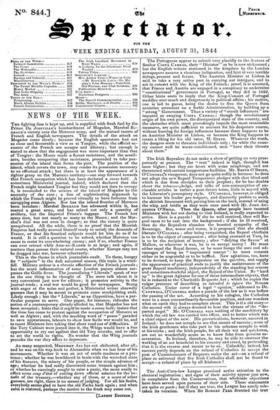The Irish Repealers do not make a show of getting
on very pros- perously at present. The " rent " indeed is high, though it has been higher ; but they are beset with some misgiVings, and are threatened with certain inopportune facilities. Mr. &arra O'BRIEN, O'CONNELL% vicegerent, does not go quite softly in harness: be does not adopt the new Repeal Temperance pledges with that blind zeal which is due from disciples to their prophet ; for he has doubts about the tobacco-pledge, and talks of non-consumption of ex- ciseable articles in rather a post-future tense, little in accord with the Liberator's peremptory style. O'CONNELL, however, is obliged to humour his leader pro tempore, and discreetly prefers to sooth the skittish lieutenant with patting him on the back, instead of using the whip and bridle as they were once used with Mr. Joux /lo- ot:rims O'NEILL. Then the Queen, after people have taunted Ministers with her not daring to visit Ireland, is really expected to . arrive. Here is a puzzle ! If she be well received, then will Re- peal seem to be cast into the background ; if she be ill received, then do the Repealers abandon the boasted sympathy of the Sovereign. But, worse and worse, it is proposed that she should liberate O'CONNELL : after being vanquished, the Repeal chieftain is to be the object of compassion ; after being crowned at Tara, he is to be the recipient of bounty ; after "defying the Saxon" at Mallow, or wherever it was, he is to accept mercy ! He must either repel the Royal favour, or he must forego the uses and ad- vantages of being an " imprisoned martyr " : he must consent either to be ungrateful or to be baffled. New agitations, too, have to be devised, to keep the Repealers on the qui-vive, and supply the appearance of practical ends to justify the maintenance of the great Repeal machinery, independently of the standing but remote and sometimes doubtful object, the Repeal of the Union. So "hard up" is the great Agitator for one of these intermediate objects, that he is reduced to the Charitable Bequests Act ; which he copies the vulgar pretence of describing as intended to injure the Roman Catholics. Under cover of a legal " opinion," addressed to Dr. CANTWELL, O'CONNELL makes a parade of the law as it was before the passing of the act. According to his eulogies, the Catholics were in a most extraordinarily favourable position, and one wonders what on earth they had to complain about. This is tle old story— the second wife is always doomed to hear the virtues of the "dc- parted angel." Mr. O'CossELL says nothing of the machinery by which the old law was carried into effect, and to better which was a chief object of the new. His prevarications, however, succeed in Ireland : he does not scruple to use that means of success ; none of the Irish gentlemen who take part in his schemes scruple to wink at his tricks ; and the Irish people, for all their wit and quickness, are not so wonderfully acute as to know false from genuine as- severation. In Ireland, therefore, he may be able to obstruct the working of an act beneficial to his country and creed, by pretending that it is the reverse and meant to be so. Unluckily, indeed, his success partly depends on the refusal of Catholics to accept the post of Commissioners of Bequests under the act—on a refusal of place so universal that five Irish Catholics shall not be found to accept—a refusal of place by all Irishmen


























